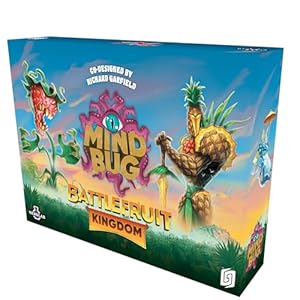Disclosure: Meeple Mountain received a free copy of this product in exchange for an honest, unbiased review. This review is not intended to be an endorsement.
Mind the Gap
I was introduced to the glory of Mindbug at Gen Con a few years ago. It was pitched as a “Magic: The Gathering” feel in 10 minutes or so. That’s a pitch I can get behind. I admire competitive card games like Flesh and Blood and Altered, but I don’t have the time (or budget) to dive into these worlds fully. That’s where something like Mindbug can scratch the itch, where all the cards are self-contained, and I don’t need to take out a mortgage to build a competitive deck. Mindbug has seen a slew of promo cards and big-box expansions, including New Servants, Beyond Eternity, and Beyond Evolution. Battlefruits Kingdom is one of the two new expansion sets under the Battlefruit line, introducing a new mechanic and featuring hideously corny and sometimes grotesque humanoid vegetation and fruit. Much like other sets, these can be played separately or mixed into other decks to mix and match your Mindbug experience.

Mind Your Manners
Every set of Mindbug contains a deck of creature cards that players wield and maneuver to reduce their opponent’s life points to zero. Players take ten cards from the communal deck and draw five; that’s your deck for the whole game.
Actions are simple: play a card or attack, and that’s it. Playing a card costs nothing but puts a creature into play with a specific power value and effect. Some creatures may have “when played” effects or a “fast” keyword that allows the creature to attack on the same turn it’s played.
Attacking is straightforward: a creature always attacks the opponent directly, and the defender may choose to block with a creature in play. Power values are compared, and the lower-power creature is defeated while the attack is blocked. Some creatures may also have “when defeated” conditions.
The juice comes from the mindbugs themselves. Each player has two and can “mindbug” an opponent’s creature, essentially stealing the played card and using it themselves. Players only have two for the whole game, so strategic timing is important.
Play continues until one player has been defeated. If a player’s deck runs out, they simply play until they can’t perform any actions, at which point they lose.

Harvest Season
The newest keyword in this expansion is “harvest.” The game includes a handful of harvest tokens, and when a creature is played with the harvest symbol, it spawns with a specified number of tokens on the card. At the beginning of each of that player’s turns, one token is automatically removed, and when all tokens are removed, that card’s harvest action triggers. Some cards include effects like “win the game” or “defeat all enemy creatures,” leading to some extremely powerful events if not dealt with. Some cards have abilities that transfer harvest tokens, essentially “refreshing” the card so it can trigger again.

Keeping in Mind
When I first played Mindbug, I was obsessed. I bought a copy and promos, and expansions, and was pitching to play all the time. But over time, the game has lost its luster. It’s not a bad game by any means, but the flow stays the same after many plays, even with new keywords.
The harvest mechanic acts as an interesting timer to shift priority toward defeating those creatures before they cause chaos. There are some really fun cards in this set, like my favorite, Pineapple Paladin, who acts as a healer (and is sturdy enough to stay in play for a while), or Artimist, whose harvest ability just wins the game for you.

Also, out of the 48 cards in the deck, only 13 have harvest abilities. I feel like that’s too few when the game’s angle is to push the new keyword. But then again, maybe too many could dilute the importance.
Overall, it’s always a decent time dueling in Mindbug. It’s never a single play and always unfolds into a best-of series. If you’re a fan of Mindbug as a whole, I recommend picking this up and mixing it into your collection. The art is goofy and fun, and the harvest mechanic adds enough “new” to mix up the tactics without slowing it down. If you haven’t experienced Mindbug yet, this set is also a solid jumping-in point, as there isn’t that much more complexity added compared to the base. Either way, this is another solid set worth checking out.











